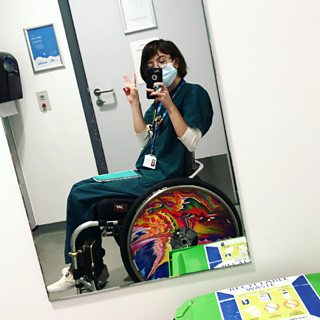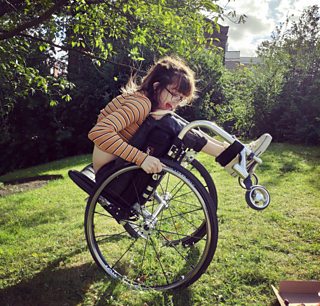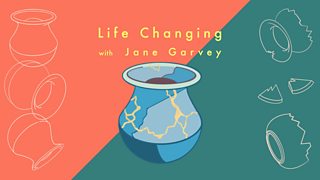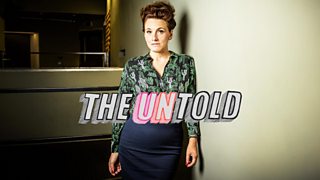A falling man left me paralysed
At 22-years-old, Grace Spence Green had a bright future planned out. She was an acclaimed and passionate climber, was living happily with her partner, and had been diligently working towards a degree in medicine.
One day, while walking through a shopping centre, she was involved in an incident that changed her life completely. In Life Changing, a new series for Radio 4, Jane Garvey interviews individuals who have extraordinary stories to tell.
This is how a matter of seconds diverted the course of Grace’s life.

Iβd been living my perfect life
In October 2018, Grace had just started the fourth year of her medicine degree – “I didn’t really have many obstacles facing me,” she reflects. She’d spent a “lovely” two months in Maidstone, Kent, on a women’s health placement. “I’d been living my perfect life from the year before, I was living on a boat with my partner, I’d just finished my master’s, so things were looking really, really positive.”

On the day in question, Grace’s friend had given her a lift back from Maidstone to London, where she was due to coach a children’s climbing session that evening. They drove to the Westfield shopping centre in Stratford, East London, from where Grace was going to catch the Tube and her friend was going to go shopping. They parted ways at the escalators, and Grace began the walk across the shopping centre towards the entrance to the Tube.
Our lives collided, literally and figuratively
“It felt like I was walking for a couple of seconds, really, and then I suddenly woke up. It was the most surreal, bizarre experience: waking up, when you thought you were already awake.” When Grace came round, after around eight minutes of unconsciousness, all she could see was the bright glow of lights above her. “It almost felt like I was in a dream, or in Heaven.” Accompanying the bright lights was the sound of screaming, and it took Grace a moment to realise that she was the one making the noise. “My second thought was: ‘Oh my God, I can’t feel my legs!’”
After a childhood spent poring over medical books and diagnosing herself with various conditions, and following several years of formal medical training, Grace immediately knew something was very wrong. “It was like my legs just ceased to exist. It felt like I’d just been unplugged from half of my body.” Though very conscious of the absence of feeling in her legs, Grace still had no idea what had happened to her. She was told that she had been hit by something, and soon became aware of a crowd of people surrounding another person on the ground nearby her. It was then that she overheard a woman telling the other casualty, “You’ve fallen from a great height.” As soon as Grace heard that, her situation became clearer. Somebody had fallen on top of her. But this wasn’t the whole story. “Later, I would find out he hadn’t fallen, he had in fact jumped.”
-
![]()
Life Changing with Jane Garvey
Listen to Grace as she tells Jane Garvey about the moment her life was transformed.
One of the nurses said she was quite scared of me
During her initial stay in hospital, Grace says that, at times, she got quite "obstinate" in an effort to make sure doctors and nurses kept her fully informed about her situation. This helped her reclaim some autonomy: “I think it was a way for me to be able to control my environment, because I couldn’t control my body or where I was, or who was going to wash me,” Grace remembers.

She then spent a “really, really intense” 10 weeks at the Royal National Orthopaedic Hospital. Here, she would be woken up at 6am every morning for breakfast before she started physiotherapy. Every night she would will herself to move her toes. “It reminded me of that scene in Kill Bill where she was trying so hard to move her toe. Because my sensations are quite strange in my legs sometimes I’d think: ‘Oh my God, I’ve just done it!’ I’d turn my phone light because I didn’t want to disturb anyone, and I’d look, and it hadn’t happened. And I’d just feel defeated again.” Grace describes the “emotional exhaustion” she felt. At this point, the reality of her condition came to light: “That’s when reality kicks in. This is me now. I have been injured, and it’s a permanent injury. That was really, really tough.”
Grace was told by a doctor that they didn’t know if she would ever walk again. “Ironically it was probably the worst weather of the year that day, and I remember wheeling outside and it was pouring with rain. I just remember feeling like my life was over. I couldn’t see how anything good could happen in my life anymore.” At present she is paralysed from the chest down and needs to use a wheelchair.
I don't have any anger
There was a sensationalism surrounding her accident, and everyone, including the nurses treating her, had an opinion on it. With everyone telling her how to feel, she struggled to decide how she herself felt about the situation. “I thought: you have no idea what you would do in this situation. It’s such a bizarre thing to happen, that you could only say if it happened to you.”
Grace came to realise that she had a “complete absence of anger” which others found hard to comprehend, so much so that she sometimes starts to second-guess her response. “I’ve thought about it over the past two years, and if I had any anger directed at this man, I’d just feel miserable. You can’t do anything with that anger.”
Instead, she focuses her frustration at situations that can bring about change, such as educating people not to push her wheelchair without permission. “That’s helpful anger because I can educate and I can talk about it.” The man who landed on Grace was sentenced to four years in prison for grievous bodily harm, yet Grace says she wouldn’t even have cared if he hadn’t been imprisoned. She says there is no need for her to forgive him, because there was no anger to begin with.
The first thing I asked was βcan I still be a doctor'?
Grace’s primary concern after her accident was whether it would impact on her ability to become a doctor. It hasn’t, and she is now in her final year of studies at King’s College London. She says that her university was "excellent" and said they’d do everything they could to support her. “Having that guarantee got me through it. I don’t know what I would have done without knowing that I was going to go back to medical school the next year. That was my main motivation for getting through all of this.”

I can go months without thinking of him
While the man that landed on Grace had an undeniably huge impact on her life, he often does not cross her mind at all anymore. Surprisingly, she isn’t haunted by "what if" moments at all. “I could very easily have died or had a higher-level injury. I just don’t see the point in these "what ifs" because they don’t exist. This is the path that I’m on, and this is my reality.” She is stoic about the event and ponders: “He could have died if he hit the ground, so in a way it’s like I might have been there to catch his fall, which I guess I take comfort in.”
My wheelchair makes me feel strong
Grace’s priorities going forward are not focused on regaining the ability to walk. She says that, if anything, she’d simply rather live in a world which was more accessible to disabled people. “In the dominant society we live in and in the media, you’re told you’re either a bitter disabled person in a wheelchair or you’re amazing because you fixed yourself and managed to walk again. I’m really happy where I am, my wheelchair makes me feel strong. What I try and communicate to people is that walking isn’t this be-all and end-all. It’s not the key to happiness.”
More To Discover
-
![]()
Life Changing
Jane Garvey talks to ordinary people about an extraordinary turning point in their life.
-
![]()
Made Of Stronger Stuff
Psychologist Kimberley Wilson and Dr Xand van Tulleken ask - one body part at a time - how much control do we have over our bodies?
-
![]()
Woman's Hour
Women's voices and women's lives - topical conversations to inform, challenge and inspire.
-
![]()
The Untold
Grace Dent presents a series documenting the untold dramas of 21st-century Britain.




